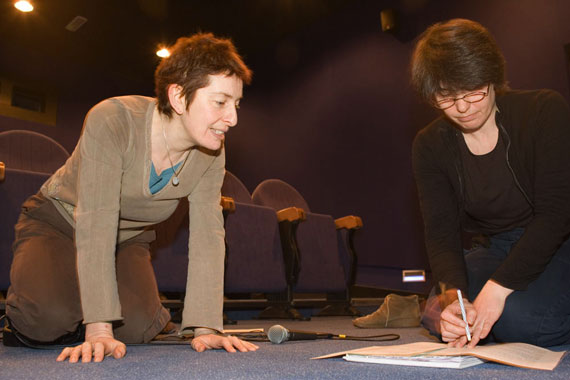|
|




Britain’s first dedicated media
centre, Watershed opened in 1982, promoting creativity, collaboration,
innovation and participation. Situated on Bristol’s waterfront,
part of a major cultural, commercial and residential regeneration development
in the heart of Bristol, it comprises three cinemas, a café/bar
and other facilities, alongside conferencing and events spaces. As
well as bringing world cinema to Bristol, www.dshed.net provides
a web platform to take local talent to the rest of the world.
In
2006, Watershed's project, Brunel Stories, involved working with Brunel
enthusiasts to create short stories in digital format, inspired by the
life and work of Brunel.
The project began by recruiting participants to relay
their stories of Brunel and Bristol’s past. Watershed provided
training and ongoing technical support to create the stories and exhibit
them on the Bristol Stories website, as well as at exhibitions at the
City Museum & Art
Gallery, the ss Great Britain, CREATE and at Watershed itself, forming
the highlight of Electric Cinema – Watershed’s online short
film cinema.
Whilst it is difficult to estimate how many visitors saw
the stories in situ at the various exhibition venues, the ss Great
Britain averaged 4872 visitors over the first 15 weeks.
The 11 stories that
were produced involve a mixture of stills, moving images, voice-overs
and soundtracks.
A number of volunteers at
Bristol’s Industrial Museum,
with a passion for engineering and Brunel participated in a training
programme and, with assistance from workshop leaders, completed their
stories digitally.
A second training workshop was aimed at artists, who
developed their own stories about Brunel, as well as learning skills
for use in the future. These Brunel Stories formed part of the Bristol
Stories project.They were three minutes long and featured voices, photographs,
drawings and other images which were made into short films using video
editing software.
The ‘storytellers’ involved all live in Bristol
and were between 30 and 50 years of age, with four being over 65. All
were pleased with their stories and enjoyed the experience of making
them. When asked, what they felt they had gained the most from the workshop,
one participant replied, “Enthusiasm for doing more”.
In terms
of legacy, the stories produced will continue to live online, as well as
being used as a demonstration about storytelling. They were used as examples
of how to use Archives more creatively during a recent event for Archivists
at Watershed.
Watershed and Bristol’s Museums, Galleries
and Archives Service are working together to involve the public in
the development of content for the Museum of Bristol (due to open in
2009). The Brunel Stories will form part of the collection.

An excerpt from
a story by Pete
Williams
“Brunel has impacted on the lives of Bristolians
and others in different ways, but there aren’t many families that
can claim to have been employed by him for over 160 years.
My great grandfather William started working on the Great Western Railway
in about 1844, only three years after the Bristol to London route was finished…
The
railway and my family soon expanded from Cornwall in the south to Chester
and Wrexham in the north, and from London to the west coast of Wales. William
worked in Cornwall …and in Somerset… where he met
and married my great grandmother, Elizabeth, and finally worked at Gloucester.
This is where his son George, my grandfather, was born in 1880.
In the mid 1890s, George started work on God’s Wonderful Railway
as an engine cleaner, soon to rise to Fireman working in London and finally
to Driver of express freight trains. He was then sent by the railways
to Wrexham to work. In 1910, great grandfather William died after working
for 64 years on the GWR…
William and George had worked on God’s Wonderful
Railway for 116 years, over a span of 100 years. I never worked on
the railways myself, but in 1996, over 150 years after great grandfather
William started working for Brunel, I got a job working for Clifton Suspension
Bridge, where I still work…. Grandfather George taught me a lot
about railways and when he died in 1950 he left me with a love of railways,
particularly God’s Wonderful Railway,
a love of mathematics through playing cards and dominoes with me, and
two chicken sheds full of chickens”.
The finished stories can be found
at www.bristolstories.org.
Links
www.watershed.co.uk
Photography: Steve Thomas.
|
|